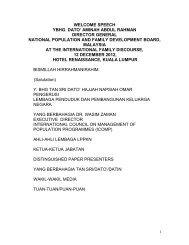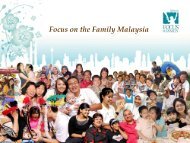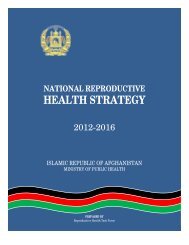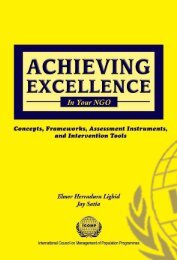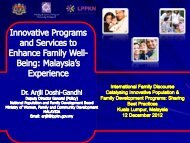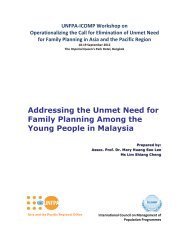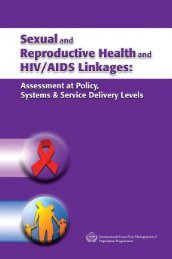Family Planning in Asia and the Pacific - International Council on ...
Family Planning in Asia and the Pacific - International Council on ...
Family Planning in Asia and the Pacific - International Council on ...
You also want an ePaper? Increase the reach of your titles
YUMPU automatically turns print PDFs into web optimized ePapers that Google loves.
that suits <str<strong>on</strong>g>the</str<strong>on</strong>g>ir needs, result<str<strong>on</strong>g>in</str<strong>on</strong>g>g <str<strong>on</strong>g>in</str<strong>on</strong>g> a low level of c<strong>on</strong>traceptiveprevalence, especially am<strong>on</strong>g <str<strong>on</strong>g>the</str<strong>on</strong>g> poor, disadvantaged <str<strong>on</strong>g>and</str<strong>on</strong>g>remote rural areas <str<strong>on</strong>g>in</str<strong>on</strong>g> Nepal (for district-level CPR, seeTable 8 below).Accord<str<strong>on</strong>g>in</str<strong>on</strong>g>g to key stakeholder <str<strong>on</strong>g>in</str<strong>on</strong>g>terviews, method choice islimited by availability, especially <str<strong>on</strong>g>in</str<strong>on</strong>g> rural areas, counsellorsare not adequately tra<str<strong>on</strong>g>in</str<strong>on</strong>g>ed or <str<strong>on</strong>g>in</str<strong>on</strong>g>formed of all opti<strong>on</strong>s, <str<strong>on</strong>g>and</str<strong>on</strong>g>clients are not adequately <str<strong>on</strong>g>in</str<strong>on</strong>g>formed so <str<strong>on</strong>g>the</str<strong>on</strong>g>y are not able todem<str<strong>on</strong>g>and</str<strong>on</strong>g> what method is best for <str<strong>on</strong>g>the</str<strong>on</strong>g>m.O<str<strong>on</strong>g>the</str<strong>on</strong>g>r challenges of <str<strong>on</strong>g>the</str<strong>on</strong>g> nati<strong>on</strong>alfamily plann<str<strong>on</strong>g>in</str<strong>on</strong>g>g programmeO<str<strong>on</strong>g>the</str<strong>on</strong>g>r challenges fac<str<strong>on</strong>g>in</str<strong>on</strong>g>g <str<strong>on</strong>g>the</str<strong>on</strong>g> nati<strong>on</strong>al family plann<str<strong>on</strong>g>in</str<strong>on</strong>g>gprogramme <str<strong>on</strong>g>in</str<strong>on</strong>g>clude: political <str<strong>on</strong>g>in</str<strong>on</strong>g>stability; difficulttopography; coord<str<strong>on</strong>g>in</str<strong>on</strong>g>ati<strong>on</strong> issues between <str<strong>on</strong>g>the</str<strong>on</strong>g> government,NGOs <str<strong>on</strong>g>and</str<strong>on</strong>g> d<strong>on</strong>ors; <str<strong>on</strong>g>and</str<strong>on</strong>g> socio-cultural practices.Political <str<strong>on</strong>g>in</str<strong>on</strong>g>stabilityVarious sources reported that, due to <str<strong>on</strong>g>the</str<strong>on</strong>g> political <str<strong>on</strong>g>in</str<strong>on</strong>g>stability<str<strong>on</strong>g>and</str<strong>on</strong>g> c<strong>on</strong>flict <str<strong>on</strong>g>in</str<strong>on</strong>g> <str<strong>on</strong>g>the</str<strong>on</strong>g> late 1990s <str<strong>on</strong>g>and</str<strong>on</strong>g> early 2000s, it was difficultto focus <strong>on</strong> family plann<str<strong>on</strong>g>in</str<strong>on</strong>g>g when even basic health needswere not be<str<strong>on</strong>g>in</str<strong>on</strong>g>g met. Resources have been directed towardsrestor<str<strong>on</strong>g>in</str<strong>on</strong>g>g peace <str<strong>on</strong>g>and</str<strong>on</strong>g> security <str<strong>on</strong>g>and</str<strong>on</strong>g> rebuild<str<strong>on</strong>g>in</str<strong>on</strong>g>g <str<strong>on</strong>g>in</str<strong>on</strong>g>frastructurefollow<str<strong>on</strong>g>in</str<strong>on</strong>g>g <str<strong>on</strong>g>the</str<strong>on</strong>g> c<strong>on</strong>flict, leav<str<strong>on</strong>g>in</str<strong>on</strong>g>g little for health programmes(FPAN, 2010). Political transformati<strong>on</strong> from a m<strong>on</strong>archialsystem to a democracy (begun <str<strong>on</strong>g>in</str<strong>on</strong>g> 2008) is tak<str<strong>on</strong>g>in</str<strong>on</strong>g>g l<strong>on</strong>gerthan expected as a new c<strong>on</strong>stituti<strong>on</strong> still has not yet beencompleted (<str<strong>on</strong>g>the</str<strong>on</strong>g> deadl<str<strong>on</strong>g>in</str<strong>on</strong>g>e had been set for May 2010). Thissituati<strong>on</strong> has caused delays <str<strong>on</strong>g>in</str<strong>on</strong>g> budget allocati<strong>on</strong>. Ano<str<strong>on</strong>g>the</str<strong>on</strong>g>rexample of how political <str<strong>on</strong>g>in</str<strong>on</strong>g>stability has adversely affectedfamily plann<str<strong>on</strong>g>in</str<strong>on</strong>g>g is that, <str<strong>on</strong>g>in</str<strong>on</strong>g> FY 2001/2002, voluntarysurgical c<strong>on</strong>tracepti<strong>on</strong> camps could not be c<strong>on</strong>ducted <str<strong>on</strong>g>in</str<strong>on</strong>g>32 districts for security reas<strong>on</strong>s (MoHP et al., 2006). Inadditi<strong>on</strong>, <str<strong>on</strong>g>the</str<strong>on</strong>g> c<strong>on</strong>flict could have reduced <str<strong>on</strong>g>the</str<strong>on</strong>g> number ofacceptors of c<strong>on</strong>tracepti<strong>on</strong>, such as young males who weredisplaced <str<strong>on</strong>g>and</str<strong>on</strong>g> young women felt threatened <str<strong>on</strong>g>in</str<strong>on</strong>g> try<str<strong>on</strong>g>in</str<strong>on</strong>g>g to181



